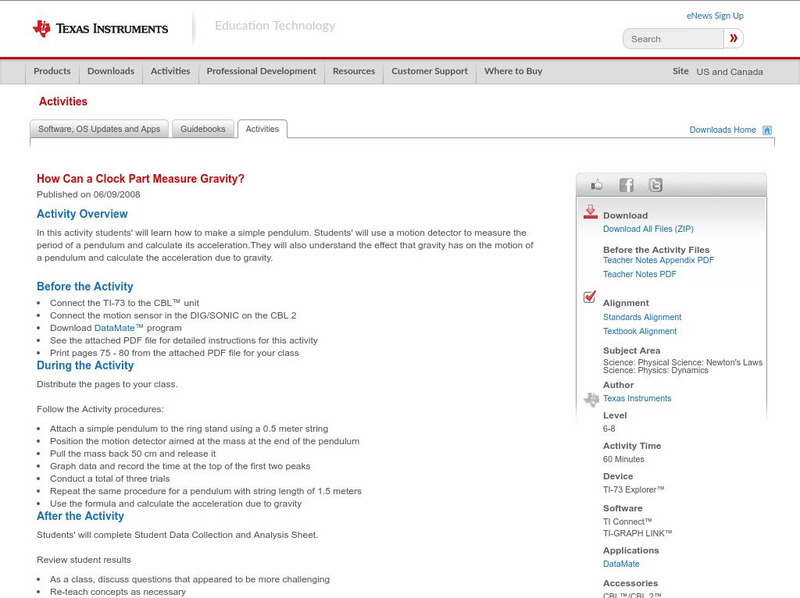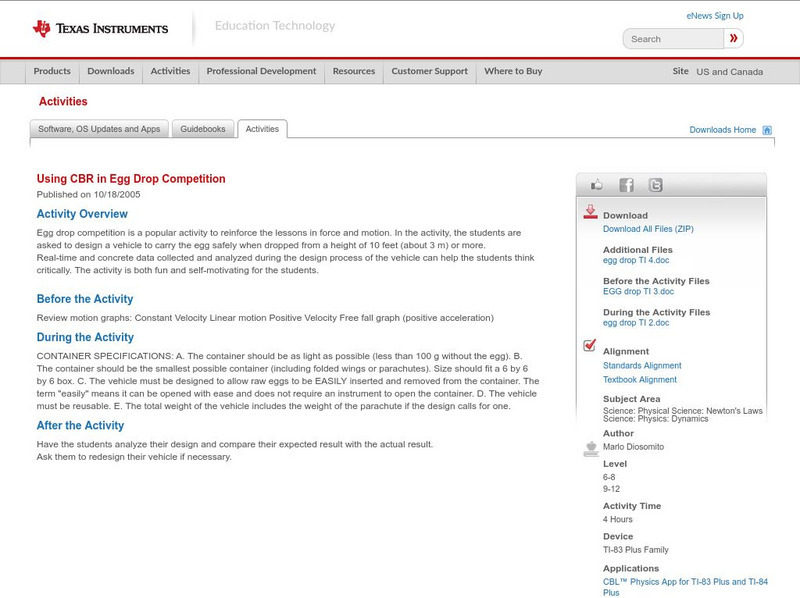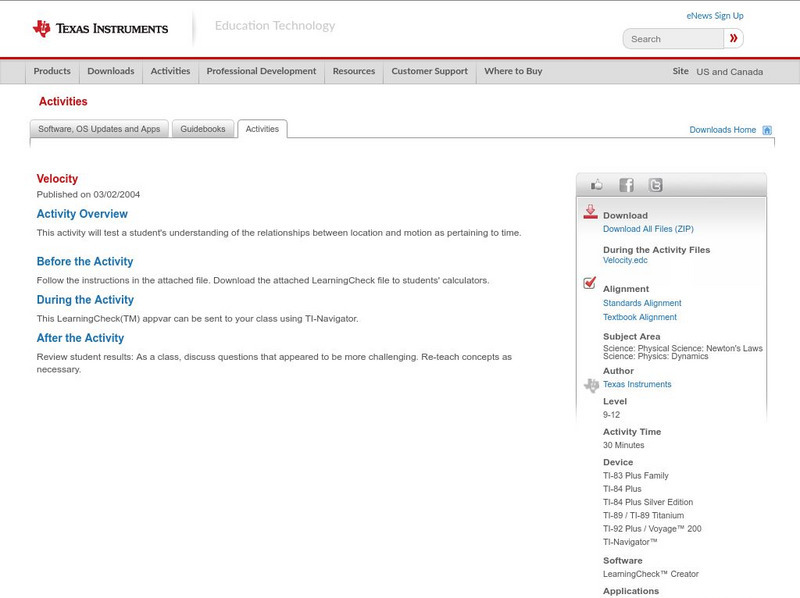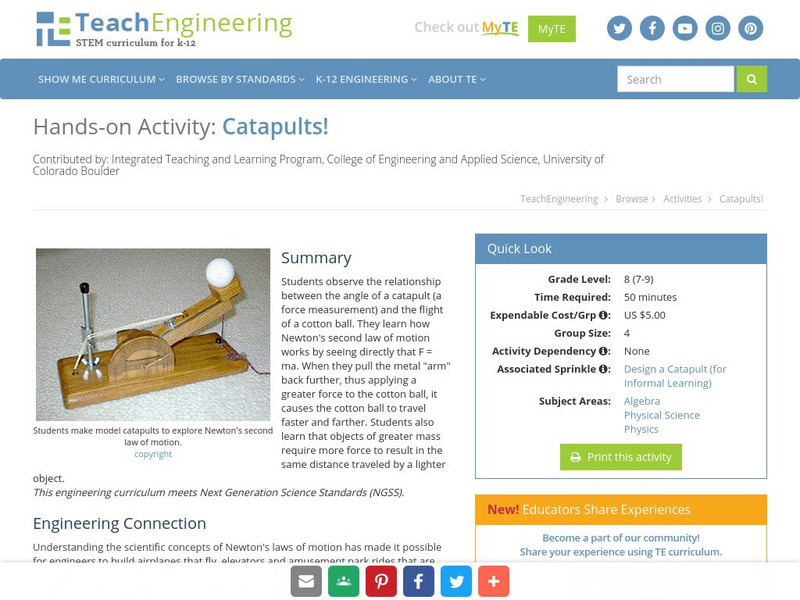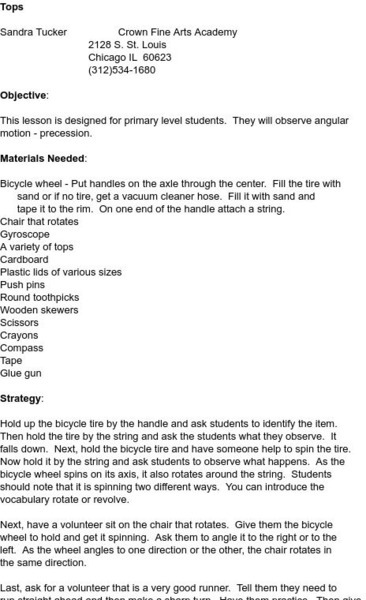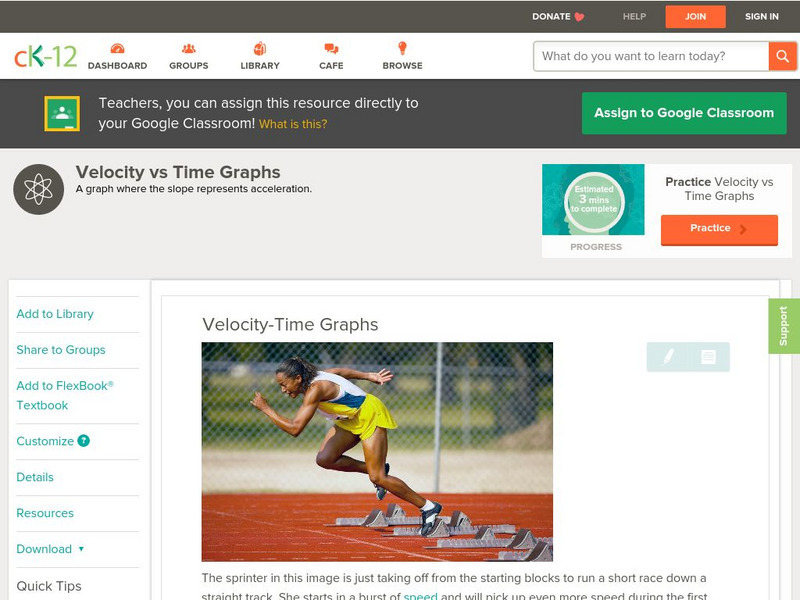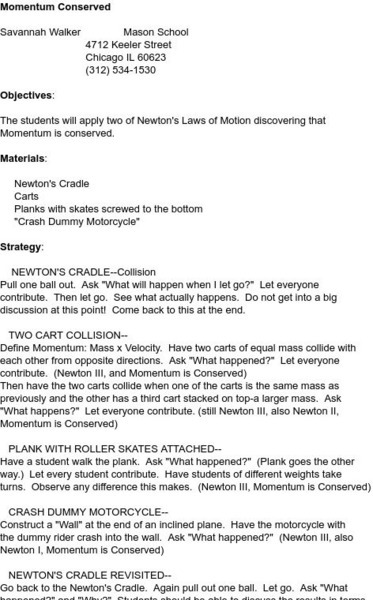Texas Instruments
Texas Instruments: How Can a Clock Part Measure Gravity?
In this activity students will learn how to make a simple pendulum. Students' will use a motion detector to measure the period of a pendulum and calculate its acceleration.They will also understand the effect that gravity has on the...
Texas Instruments
Texas Instruments: Using Cbr in Egg Drop Competition
Egg drop competition is a popular activity to reinforce the lessons in force and motion. In the activity, the students are asked to design a vehicle to carry the egg safely when dropped from a height of 10 feet (about 3 m) or more....
Texas Instruments
Texas Instruments: What's Your Speed?
In this activity, students' will use a motion detector to determine what effect the speed at which a person moves has on the appearance of the distance versus time plot.
Texas Instruments
Texas Instruments: Velocity
This activity will test a student's understanding of the relationships between location and motion as pertaining to time.
ClassFlow
Class Flow: Forces in Action
[Free Registration/Login Required] This flipchart explains weight and gravity and engages students in activities using force and motion.
TeachEngineering
Teach Engineering: Catapults!
Students observe the relationship between the angle of a catapult (a force measurement) and the flight of a cotton ball. They learn how Newton's second law of motion works by seeing directly that F = ma. When they pull the metal "arm"...
TeachEngineering
Teach Engineering: You're a Pushover!
The purpose of this activity is to demonstrate Newton's 3rd Law of Motion, which is the physical law that governs thrust in aircraft. The students will do several activities that show that for every action there is an equal and opposite...
Center of Science and Industry
Cosi Columbus: Push It Out Rocket
Science experiment that explores Newton's Third Law. Includes full list of materials, procedures, and scientific explanation.
CK-12 Foundation
Ck 12: Physics Simulation: Pirate Ship
[Free Registration/Login Required] Learn about Newton's 3rd Law, and how the concept of the 'force pair' allows us to understand interactions between objects using this interactive simulation. A PDF worksheet and a video tutorial are...
Science and Mathematics Initiative for Learning Enhancement (SMILE)
Smile: Lab Activity: Tops
The Illinois Institute of Technology provides a lab activity on precession and spinning tops. Designed for primary grades, but easily adapted for any level. Includes directions and assessment ideas.
Other
Glenn Turner: Gyroscope Math Page
The mathematics associated with gyroscopes can be investigated through this interactive page. Users enter critical parameters about gyroscopes and rotational motion descriptors are given.
The Wonder of Science
The Wonder of Science: Ms Ps2 1: Collision Design Solution
Help your students explore how the motion of objects changes during a collision. This website includes work samples, phenomena, assessment templates, and videos that focus on collision design solution.
TED Talks
Ted: Ted Ed: What if Everyone Jumped at the Same Time?
If every action has an equal and opposite reaction, what kind of physical action would it take for the earth to notice us? Check out Vsauce's video on what would happen if everyone on Earth got together and jumped. [7:13]
Physics Aviary
Physics Aviary: Practice Problems: Car on a Turn Problem
Students must determine the force of friction on a car on a turn and the maximum speed the car could navigate a turn.
TeachEngineering
Teach Engineering: May the Force Be With You: Thrust
In this instructional activity, students will study how propellers and jet turbines generate thrust. This instructional activity focuses on Isaac Newton's 3rd Law of Motion, which states that for every action there is an equal and...
Walter Fendt
Walter Fendt: Apps Zur Physik
This site, in German, offers numerous apps that illustrate common physics principles. Apps are organized into categories: mechanics, oscillations and waves, electrodynamics, optics, thermodynamics, the theory of relativity, physics of...
CK-12 Foundation
Ck 12: Physical Science: Inertia
[Free Registration/Login may be required to access all resource tools.] Explains inertia and how it affects motion, the relationship between inertia and mass, and how to overcome inertia.
CK-12 Foundation
Ck 12: Physical Science: Velocity Time Graphs
[Free Registration/Login may be required to access all resource tools.] How to draw a velocity-time graph and what it represents.
Texas Education Agency
Texas Gateway: 4.1 Development of Force Concept
By the end of this section, you will be able to understand the definition of force.
Wikimedia
Wikipedia: Centripetal Force
Wikipedia's site on centripetal force provides a section explaining the difference between centripetal force and centrifugal force. Includes formulas and hyperlinked terms.
Wikimedia
Wikipedia: Rocket
Wikipedia provides an encyclopedia definition of a rocket, including information on rocket history, size, types, and more.
Texas Education Agency
Texas Gateway: 4.8 Extended Topic: The Four Basic Forces: An Introduction
By the end of this section, you will be able to understand the four basic forces that underlie the processes in nature: gravitational, electromagnetic, weak nuclear, strong nuclear forces.
Science and Mathematics Initiative for Learning Enhancement (SMILE)
Smile: Momentum Conserved
This site by the Illinois Institute of Technology gives a Lab activity in which students use a variety of toys to discover Newton's second law and momentum conservation. Newton's cradle, skate boards, and a toy motorcycle are incoporated...
Curated OER
Educational Technology Clearinghouse: Clip Art Etc: Sir Isaac Newton
(1642-1727) English natural philosopher, mathematician, and physicist most famous for gravity and his laws of motion.
